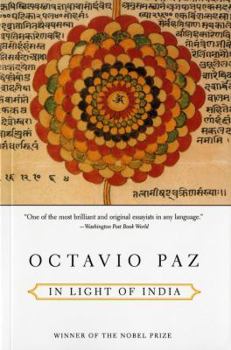In Light of India
Select Format
Select Condition 
Book Overview
"One of the most brilliant and original essayists in any language" (Washington Post Book World) reflects on the six years he spent in India as Mexican ambassador-and reveals how the people and culture of that extraordinary land changed his life. Translated by Eliot Weinberger.
Format:Paperback
Language:English
ISBN:0156005786
ISBN13:9780156005784
Release Date:April 1998
Publisher:Ecco Press
Length:224 Pages
Weight:0.50 lbs.
Dimensions:0.7" x 5.2" x 7.9"
Customer Reviews
5 ratings
Lyrical remembrance of time spent in India by a poet
Published by Thriftbooks.com User , 16 years ago
This book is a lyrical remembrance of the time spent in India by Octavio Paz, a celebrated poet, who served briefly as an attaché in the Mexican embassy in India. It is a fascinating exposition of the country's landscape, history and the rich tapestry of culture. In spite of being caught between two worlds, his native Mexico and India, which assumes mythic proportions, he notices such a plethora of details. "The Antipodes of Coming and Going" is a poetic journal of his days in India. He notices with such clarity the extraordinary richness of sight, sound, smells and effect of India. "Religions, Castes, Language" gives an overview of India but has some factual errors. The occassional factual errors like "The British Empire, for the first time in Indian history, united all the people under its domain, something their predecessors-the Maurya, the Guptas, the Mughals-could never achieve" doesn't bother at all. "A Project of Nationhood" is where Paz compares Islamic,Hindu and Western civilization in their relation to India. This and the last section "The Full and the Empty" where he celebrates the soul of India - these two sections reveal the genius of Paz. His last question "In what time do we live"? is ever relevant in India.
A book that bridges continents
Published by Thriftbooks.com User , 23 years ago
"In Light of India" is a book-length, multi-part essay in which Mexican poet Octavio Paz discusses the complex political, religious, and artistic worlds of India. Paz, who had served as his nation's ambassador to India, writes with insight and obvious affection for his subject.Paz is a masterful prose writer. His style is smooth and clear, and full of sage-like statements. Consider this observation: "Dialogue between a poet and a saint is difficult because a poet, before speaking, must hear others--that is to say, the language, which belongs to everyone and to no one. A saint speaks with God or with himself, two forms of silence" (p. 118).Paz covers many topics: India's ancient history, the conflict between Hindus and Muslims, the caste system, classical Sanskrit poetry, and more. But, as he notes, the book is not meant to be an exhaustive scholarly treatise. Rather, it is a very personal view of India: "this book. . . is the child not of knowledge but of love" (33). And as such, the book is rich in interesting anecdotes and fascinating insights, from Paz' account of his meeting with the guru Mother Ananda Mai to his reflection on the influence of Rabindranath Tagore upon Pablo Neruda. "In Light of India" is a marvelous companion volume to Salman Rushdie's "The Jaguar Smile": in that volume of essays, a writer from the Indian subcontinent reflects upon a Latin American country (the reverse of Paz' project). But on its own, Paz' book is a wonderful volume both for fans of Latin American literature and for those interested in India.
Just brilliant.
Published by Thriftbooks.com User , 24 years ago
A welcome change to see things through a great poet's eye. Brilliant comparisons of the cultures of two great countries Mexico and India, a culture that died and a culture that still lives and is thriving.
Engaging yet Uncertain
Published by Thriftbooks.com User , 25 years ago
Kudos to Paz for discoursing on India's nationhood, religion and caste. Uncertainty is the underlying theme in this book. Unlike Mexico, India proves to be a bigger (and alien) challenge to Paz's analytical and intellectual ability and at the start of the book the reader wonders - will this be the Indian Labyrinth of Solitude?Paz's love for India and his desire to find answers to (paradoxical?)questions engages him in a duel that is serendipitous for him and cahallenging yet enjoyable to the reader. His bafflement is typical in a land where `one man's ceiling is another man's floor'. You can contest every assertion he makes - but wait! A few paragraphs later he himself is left questioning his earlier assertions. What starts out as an exercise in `jnana yoga' (comprehension through knowledge) in the end turns out to be a discourse without conclusions. But as Paz mulls and ponders, his vexations and observances transform itself into a wonderful literary offering of bhakti- an expression of love and admiration for India and its richness and complexity - an offering of devotion that supersedes comprehension.
A place to start in understanding India
Published by Thriftbooks.com User , 26 years ago
In reading foreigners write about India, too often you see them get caught on the horns of the complexities and contradictions of India. Invariably their real subject is not India, but how foreigners perceive India. What makes Paz's book special is that he is really writing about the Indian mind, and like an Indian he is able to wrap his mind around the contradictions without attempting to resolve them. This book is now my top recommendation for anyone trying to get past castes, dust, and buses falling over cliffs to begin to understand India.




